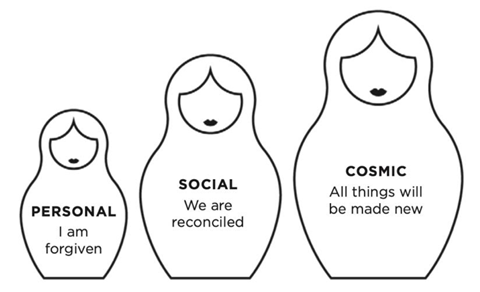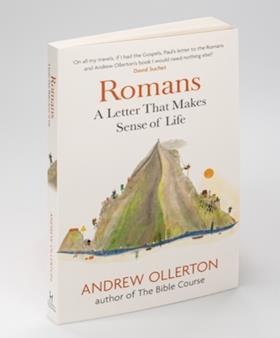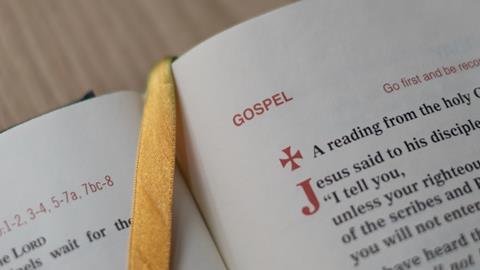Theologian Dr Andrew Ollerton explores what the gospel is and why he believes it needs to be shared
I wonder if there’s a city on your bucket list? Some place you’ve always wanted to visit? For me, it was always Rome…then finally I got to visit the ‘eternal city’ last year and it did not disappoint:
Ancient History x (Pasta Carbonara + Pistachio gelato)2 = winning formula!
In the 1st Century, Rome would surely have been everyone’s city of choice. With more than a million residents by AD 100 it dwarfed all other urban centres. In fact, no other European city reached the equivalent population until London in the 18th Century! The emperor, along with wealthy senators, lived in palatial luxury on the famous seven hills overlooking the city, with heated swimming pools. From AD 80 onwards, the spectacular Colosseum, a 50,000-seat stadium for theatre and blood sports, dominated the skyline. Conquest and victory, power and glory were in the air. As historian Tom Holland put it: “The Roman Empire put a premium on vanity.”
Read more:
Are there contradictions in the Bible?
Can the Gospels be trusted?
How should I read scripture?
Are the Gospels based on eyewitness testimony?
So, everyone longed to visit Rome. To admire the architecture and pay homage to the gods and celebrities. Everyone, that is, except the Apostle Paul. While most people dreamt of visiting Rome as tourists, Paul planned to go as an evangelist:
“I am eager to preach the gospel to you also who are in Rome…I am not ashamed of the gospel, for it is the power of God for salvation to everyone who believes.” Romans 1:15–16 (ESV)
The fact that Paul felt the need to say “I am not ashamed” indicates a certain amount of internal conflict. Perhaps he knew what it was to feel intimidated by a culture that seemed to have it all. What could a message about a crucified Jew have to offer Roman citizens with hot tubs, servants and theatre tickets?
How confident are you that your city, colleagues and neighbours need Jesus? Being honest, I struggle to see it sometimes. Unless a crisis flares up, my non-Christian friends seem pretty satisfied so long as their kids are safe, they holiday somewhere warm and their sports team isn’t relegated. Immersed in a culture with Premier League football, Netflix and Nandos, it’s easy to live more like cultural tourists than Jesus-evangelists. Perhaps you feel awkward when Christianity comes up in conversation. Being honest, how confident are you in the gospel? Which would you circle right now?

Despite a lower score than I would have liked, as I’ve immersed myself in Paul’s letter to the Romans, I’ve become a bit bolder. Recently, I went to the pub with friends I play football with. When they asked me what I do for a living, instead of side-stepping, I replied: “I help people understand the Bible.” Awkward silence. Then one of them said he’d done Religious Studies A Level and remembered the Gospels.
“There’s four of them, right?”
“That’s right,” I replied, “and that is enough to convince me.”
“What do you mean?”
“Well, in the ancient world, writing on parchments was expensive. Even a great Roman emperor would only deserve a couple of short biographies.”
“So?”
“For a Jewish carpenter, brutally crucified at a young age, to get four detailed biographies… something nuclear must have happened!”
Thoughtful silence. The conversation continues …
As I’ve spent time researching and writing a new book on Romans my confidence in the gospel has grown. I am not as shy anymore. Let me share a couple of reasons why:
Get access to exclusive bonus content & updates: register & sign up to the Premier Unbelievable? newsletter!
The gospel is a rooted story
Throughout Romans, Paul quotes from and alludes to the Old Testament in numerous ways. I find this deeply reassuring. The gospel is not an abstract idea or a new philosophy. It is a story deeply rooted in history. As Paul says, it was “promised beforehand through…the Holy Scriptures” (Romans 1:2) and now has been “revealed and made known” (16:26).
The plotline traces back to Abraham (c.1800 BC). God called him into a covenant relationship in order that his descendants (Israel) might restore blessing to all creation. Where Israel failed, the Messiah – “a descendant of David” (1:3) - has succeeded. Rather like Russian dolls, the “gospel message … about Jesus” (16:25) is therefore nestled inside a much larger story.
Why does this increase my confidence? For the same reason being roped to a boulder reassures me when climbing a big mountain. The tug of the rope around my waist reminds me that I am connected to something solid and immovable. So it is with the gospel. We are united to Christ by faith. Our fragile, vulnerable selves are connected to something historic and certain. The gospel is underwritten by the faithfulness of God, who will not break his promises even if that means giving up his own Son. If this “God is for us, who can be against us?” (Rom. 8:31–2). Can you feel the tug of the rope? As we face life’s challenges, we are rooted and established in a story that reaches all the way back to creation and stretches the way forwards to a new creation.
“The vastness of what God has accomplished is far larger than the word ‘salvation’ usually suggests … Paul’s understanding [of] the gospel encompasses the cosmos, the whole of creation – all the way out and all the way down in human life.” Beverly Gaventa
The gospel is a relevant story
In Romans, Paul introduces “the gospel of God” (1:1). Don’t miss the scale of what he had in mind. This good news message is not just a private insurance policy for when I die. While it includes forgiveness of sins and a right standing before God, the gospel is also good news on a cosmic scale. Jesus was crucified to reconcile enemies and to break the curses that hang over creation. His resurrection was a decisive victory for the entire planet. As Romans 8 puts it, the natural world is “groaning” in anticipation of the glory that’s to come. Meanwhile, the Spirit is gathering a new humanity from every nation to inhabit this future glory.

The gospel is like nested dolls
So, the message of Jesus is not private belief but public truth. It should not be confined to religious studies lessons or sermons. In ancient Rome and in our modern culture, the gospel confronts the ‘big boys’ who want to control the world and fix all the problems. In Paul’s day, this meant Caesar and the Empire. In our day it might include expansionist states, Big Tech and political ideologies. The gospel announces that Jesus is Lord of the world, not Caesar or Google.
This message is more relevant to every sphere of life than we’ve dared to imagine. Think about the topics covered in the letter of Romans alone: human sexuality (Rom 1), the natural environment (Rom 8), revenge culture (Rom 12), civil authorities, taxes and finance (Rom 13), race relations (Rom 14), global mission (Rom 15). Nothing sits outside the remit of the gospel.
Why might this increase our confidence? Well, imagine someone pulling on a length of rope only to discover it’s actually an elephant’s tail (perhaps not on a mountain this time!). Suddenly, the world’s most powerful mammal is staring down at them. We may imagine the gospel to be a small, isolated, religious truth. But when we really get hold of it we begin to experience it for what it really is… “the power of God that brings salvation” (1:16).
“The gospel is a spicy pepper that outwardly seems to be cold … But the person who crunches it between the teeth experiences the sensation of burning fire.” Theodoret, 5th Century Syrian bishop
Paul wasn’t fazed by the power and luxury of Rome. He knew that human life will only flourish under the Lordship of Christ. The gospel is the only story rooted in prophetic history and relevant to every millimetre of our lives. In our affluent and sophisticated culture, we have nothing to be ashamed of. We are heralds of the one message that will deliver on its promises. No amount of technology, science, education or activism can fix what’s broken. Only Jesus Christ will do that.
That’s why I’m not so shy about the gospel anymore. Instead, I want to live it out and share it on. How about you?
Check out Andrew’s new book Romans: A letter that makes sense of life (Hodder).

Dr Andrew Ollerton is a theologian, pastor and popular communicator. He developed The Bible Course for small groups and is also author of The Bible: A Story That Makes Sense of Life (Hodder). Andrew is married to Charlotte. They have four chickens, three kids, two fish, a snake and a dog.


























